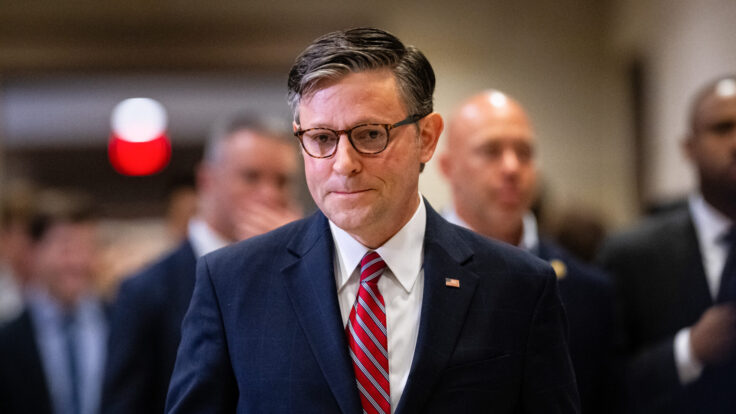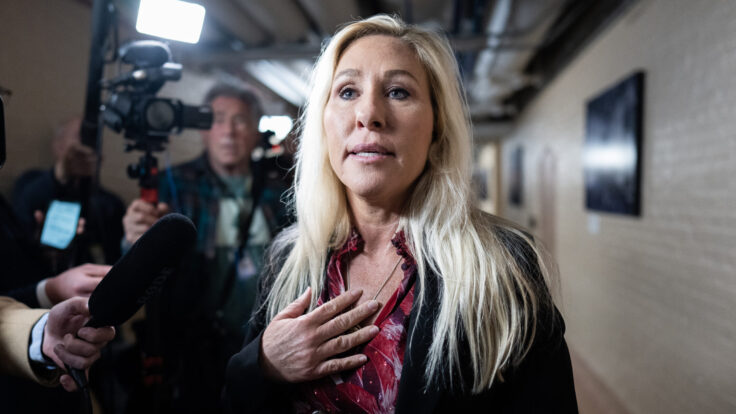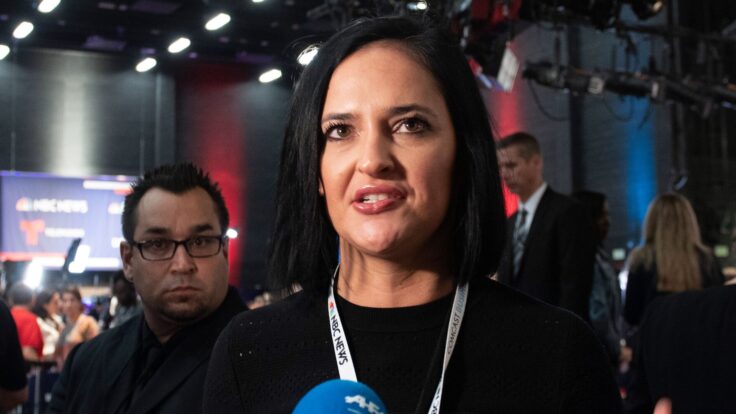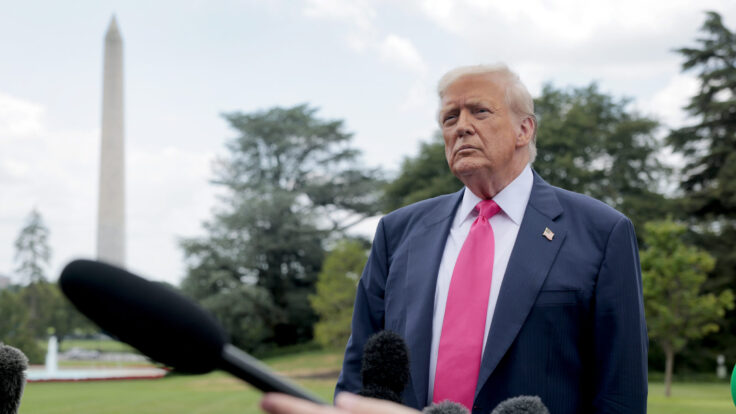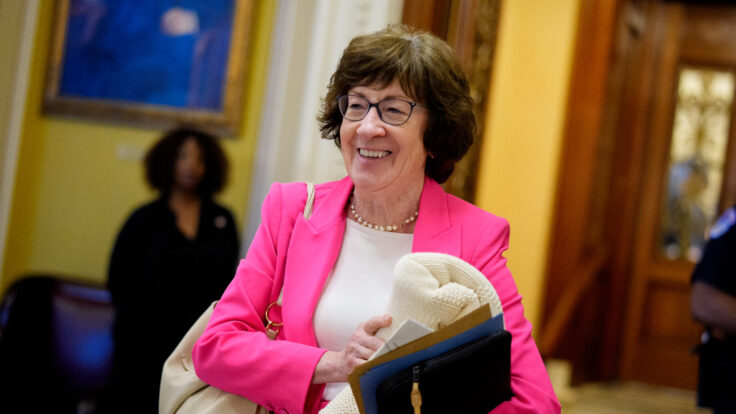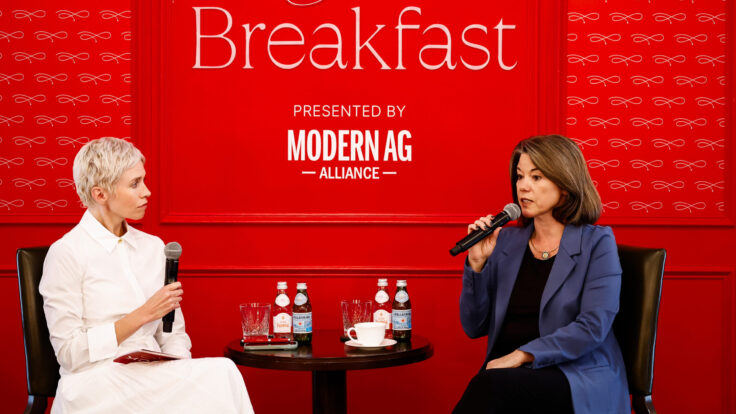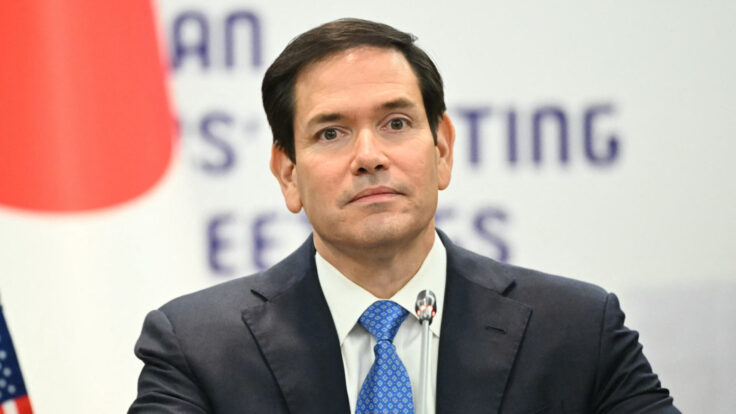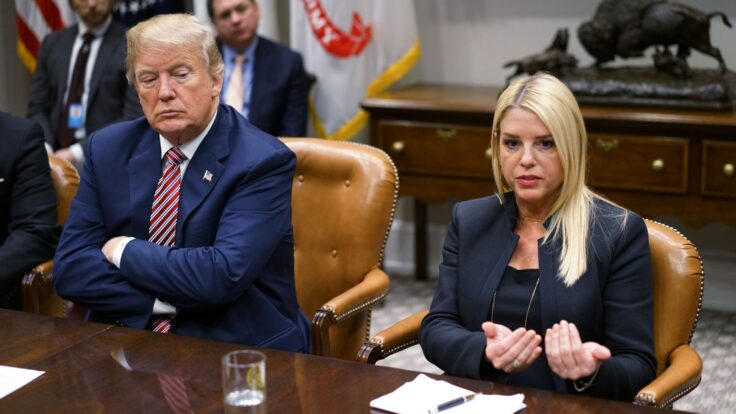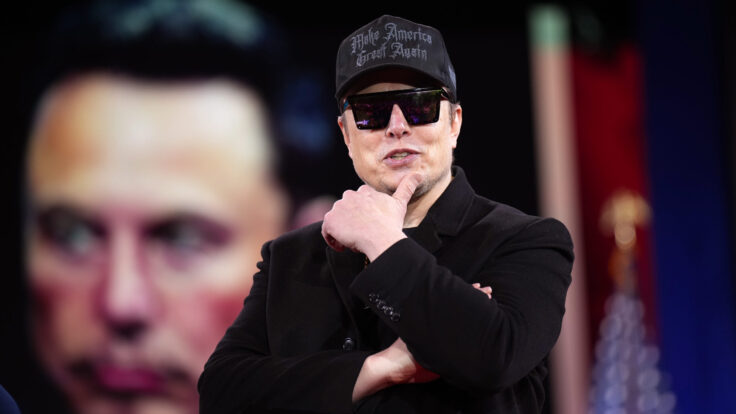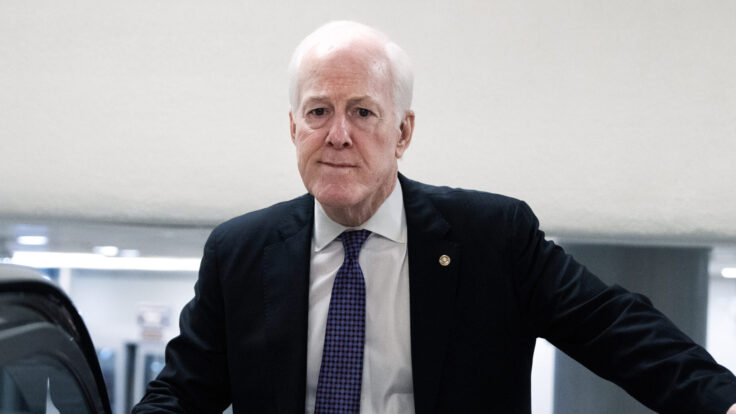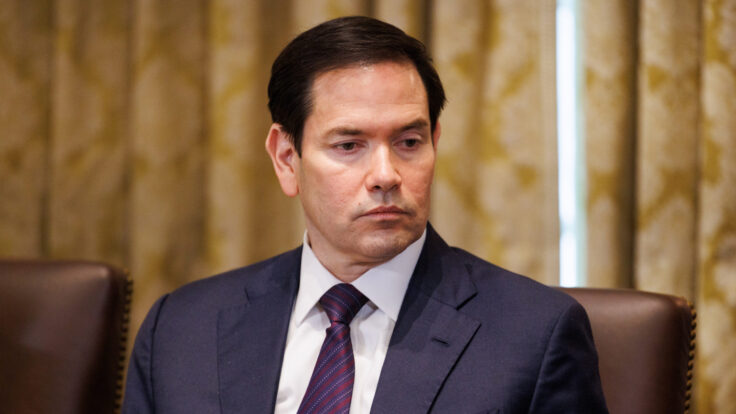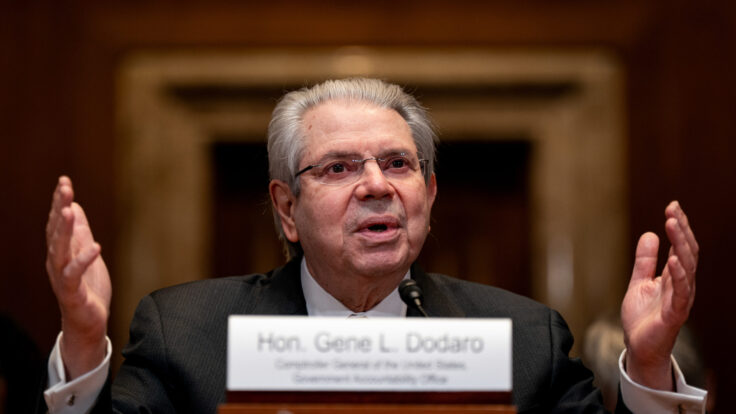Welcome back to The Best & The Brightest. I’m Abby Livingston, here with your special Sunday supplement focused on what’s around the corner in Washington.
In tonight’s edition, news and notes on this week’s Republican quasi-war over the H-1B program, the rare political debate that has placed Trump at odds with his anti-immigration base, and the Sunday show shadow campaign to keep Mike Johnson as House speaker. Then, Dylan Byers offers an update on The Washington Post’s recent turmoil, and Baratunde Thurston and Bill Cohan close out the issue with a conversation, presented by Meta, about Wall Street’s A.I. paradox.
🎧 Trump’s tech orbit: By the way, if you missed my partner John Heilemann’s latest Impolitic podcast, he teamed up with Dylan Byers to kick around a few theories about the implications of the tech and entertainment C.E.O.s kissing Trump’s ring. They also discuss the media industry’s most significant macro trends, and anoint its three biggest winners and losers. Check it out here.
|
|
|
Open Source AI: Available to all, not just the few.
Meta’s open source AI enables small businesses, start-ups, students, researchers and more to download and build with our models at no cost.
When AI models are open source, they’re available to all. And when AI models are available to all, everyone benefits.
Learn more about open source AI.
|
|
|
King of the Hill: Elon Musk
|
Just a week after he derailed negotiations to avoid a government shutdown, Elon Musk has made himself the central player in a widening internecine flame war over the H-1B visa program, which allows American companies to hire skilled foreign workers and is particularly popular in Silicon Valley. In doing so, he’s exposed a fault line in the Republican coalition, between old-guard MAGA populists and wealthy new converts in the tech industry, that may foreshadow more chaos for Mike Johnson’s fragile majority on the Hill.
To recap: Last week, Trump appointed Indian American venture capitalist Sriram Krishnan as a senior advisor on A.I. policy, triggering a prolonged rant from far-right anti-immigrant influencer (and occasional Trump travel companion) Laura Loomer about Krishnan’s past support for raising skilled immigration quotas. Loomer’s tirade featured increasingly personal attacks on Krishnan—an ally of new-right figureheads David Sacks, Marc Andreessen, Musk, and others—as well as nativist and sometimes outright racist critiques of foreign-born tech workers. The metastasizing debate kicked into overdrive when Vivek Ramaswamy weighed in to argue that, in fact, tech companies are leaning on skilled immigrants because “American culture … has venerated mediocrity over excellence.”
Musk, himself a beneficiary of the H-1B program, vowed to “go to war over this issue the likes of which you cannot possibly comprehend.” Having told opponents to “take a big step back and FUCK YOURSELF in the face,” Musk on Sunday suggested that people “Please post a bit more positive, beautiful or informative content on this platform.”
A ceasefire appeared to have been negotiated over the weekend after Trump endorsed the program in an interview with the New York Post, breaking his silence on the issue after days of intra-MAGA social media combat. Trump’s position here shouldn’t be surprising: He’s repeatedly articulated support for high-skilled immigrants, and has a long history of employing foreign workers at his own properties. During his first tour as president, his son-in-law, Jared Kushner, spearheaded a failed effort to reform U.S. immigration laws to implement a points-based system, akin to the model in Canada, to prioritize wealthy, accomplished, or highly educated immigrants. More recently, Trump has expressed his view that foreign-born students attending college in the U.S. should “automatically” get a green card upon graduation. On Friday, a video featuring Trump’s comments was retweeted by Musk.
Nevertheless, the vitriol unleashed by the H-1B clash foreshadows a possible schism in the MAGA coalition as the Republicans—soon to hold a power trifecta in Washington—return to the Hill to put the president-elect’s vision into action. Until somewhat recently, Trump’s campaign messaging has mostly fixated on his desire to enact mass deportations of illegal immigrants (and, in some cases, to strip temporary protected status from legal immigrants, such as the Haitian refugees in Springfield, Ohio). Now, a lesser-discussed sub-debate over high-skilled foreign workers has spilled into public view, pitting nativist elements of the MAGA base against relative newcomers like Musk and Ramaswamy, who have a personal (and economic) interest in recruiting more foreign talent.
Many of these policy disagreements will be hashed out in the White House—both at the agency level and via Trump executive orders. Congress does regulate the quota of H-1B visas, with the cap currently set at 65,000 per year, and it’s not hard to imagine Trump (or Elon) leaning on members to maintain or even raise that number. Whether the incoming Congress has the political will to countenance more sweeping changes remains to be seen: Comprehensive immigration reform has been the graveyard for more than a few political careers, and lawmakers may be content to let Trump handle border policy via D.H.S. But this whole spat certainly has put the topic on the front burner, at least as long as Musk, Krishnan, Ramaswamy, and other members of the new technocratic right remain in Trump’s good graces.
|
|
Swearing-in day is just five days away. The traditionally biannual ceremony used to be a giddy, first-day-of-school affair—nothing of substance happens, and members are on their best behavior in front of their families as they take the oath and elect a speaker. But lately, it’s become one of the stranger days of the term. Back in 2019, the new Democratic wave arrived amid a prolonged shutdown. In 2021, it was still the high Covid era, the Capitol was mostly empty, and there was a sinister atmosphere hanging over the proceedings, which occurred just three days before the January 6 insurrection. And, of course, swearing-in day in 2023 lasted four days, as Kevin McCarthy struggled through 15 ballots to secure the 218 votes he needed to become speaker.
Similarly, the question ahead of next Friday’s ceremony is whether Speaker Johnson has the votes to hold on to the gavel. He had a brutal run-up to the holiday recess, as Musk and Trump wreaked havoc on his plan to keep the government funded. House Republicans managed to avert a shutdown at the last minute. Still, Johnson’s future seems somewhat murkier today than it was two weeks ago.
|
|
|
Open source AI helps more people build amazing things.
Meta’s open source AI is available to all, not just the few. Which means more people can build amazing things.
It enables small businesses, start-ups, students, researchers and more to download and build with our models at no cost.
Learn more about open source AI.
|
|
|
|
The speaker did receive a vote of confidence on ABC’s This Week from sophomore Rep. Mike Lawler, who, amid a Democratic onslaught last cycle, managed to expand his margin of victory, and who appears ready to rumble with the Freedom Caucus types threatening to sink Johnson’s speakership. When anchor Jonathan Karl asked Lawler if Johnson will and should be speaker, the New York Republican answered, “Yes and yes. The fact is that Mike Johnson inherited a disaster when Matt Gaetz and several of my colleagues teamed up with 208 Democrats to remove Kevin McCarthy, which will go down as the single stupidest thing I’ve ever seen in politics.” Lawler continued: “With that said, removing Mike Johnson would be equally as stupid. The fact is that these folks are playing with fire.”
One reason Johnson is even in contention for the speakership is that Republicans held on to seats like Lawler’s. Even so, Johnson has a nearly impossible margin. Kentucky conservative iconoclast Thomas Massie has already stated he will not vote for Johnson. Massie is almost always the first Republican contrarian on these kinds of votes, and it was all but assumed that he would take this position. The question for Johnson and the House G.O.P. conference is whether others will follow him. “If they think they’re somehow going to get a more conservative speaker, they’re kidding themselves,” Lawler said. “Mike Johnson is arguably the most conservative speaker that’s ever been elected to the office. … I’ll be very clear, as I was during the Kevin McCarthy fight: I’m not going to bend to their will. So if they think somehow that they are going to end up in a stronger position by removing Mike Johnson, they’re not.”
Lawler also hinted at a stick to keep Republicans in line: the presidential certification on January 6, where the speaker serves as presiding officer. No speaker, no Trump certification. “We can’t get anything done unless we have a speaker, including certifying President Trump’s election on January 6th,” he said. “To waste time over a nonsensical intramural food fight is a joke.”
And now, here’s my partner Dylan Byers with an update on the latest roiling drama at the Post, Washington’s hometown paper of record…
|
|
|
 |
Dylan Byers |
|
Inside the Washington Post Transfer Portal
|
In the two months since the presidential election, as it’s become apparent to an already disillusioned Washington Post staff that Will Lewis’s grand plan for pulling the the paper out of its extended malaise amounts to a convoluted newsroom restructuring led by the existing masthead, several of the company’s most notable journalists have decided that it’s finally time to consider their options. The coup de grâce for these folks—after years of diminished influence, ennui, and recurring bouts of antipathy toward Lewis, himself—appears to have been the surprise news that their beloved colleague Matea Gold would be decamping to The New York Times upon being passed over for the top editor job.
Could it have really been a surprise that Lewis and Jeff Bezos would view a largely innovation-lite, lifer-ish newsroom executive as an also-ran stalking horse in their search? Gold, who lined up a lesser job at the Times, represented an umbilical link to the past, a comforting figure amid a slowly unfolding and darkening regime change—all reasons she would never have gotten the job in the first place. (Indeed, Lewis didn’t even present a counteroffer to keep her from going to the Times.) But for many in the newsroom, her departure was of seismic significance. And the camel’s back had already been piled high with straw.
Anyway, last week, I reported that Lewis had quietly decided to appoint acting executive editor Matt Murray to that position permanently, possibly for lack of any better option. (The muted communication of the announcement is an apt metaphor for the enthusiasm generated by the appointment.) Even though these are all, ostensibly, business decisions rendered to rescue a company hemorrhaging nearly $100 million per year, the Matt-over-Matea news was received rather personally by many in the building. “People are very upset about Matea,” one source told me the other day, “And then you ruined everyone’s weekend with the Murray news.”
I am now reliably told that well-known political reporters including Josh Dawsey, Ashley Parker, Tyler Pager, Michael Scherer, and several others are either mulling a transfer or have already decided to exit. Dawsey, for instance, is said to be entertaining multiple offers while on book leave—a notably contemplative choreography befitting the modern Post. Parker is in late-stage negotiations with The Atlantic. Historically, these reporters have stayed loyal to the Post due to their faith in the storied institution—and, for a time, its centibillionaire owner—and the benefits of being a bigger fish in a smaller and less cutthroat pond. Now, many seem to fear the consequences of staying on too long, particularly amid the specter of yet another round of what I’m told will be severe layoffs across the company in the year ahead.
Meanwhile, under David Shipley, the Post’s opinion page—once considered the “second newsroom,” I think, but now a subset of the first, possibly—has already seen a wave of defections in recent months, including editors Chuck Lane and Amanda Katz, art director Chris Rukan, and columnists Robert Kagan and Michele Norris, to name a few. That’s to say nothing of the several folks who quit the editorial board (though not the paper, itself) in the wake of Bezos and Lewis’s controversial decision to forgo a presidential endorsement. “You tell me, is that normal turnover?” one Post source asked me. “In this environment where people cling to bad jobs? I don’t think so.”
Continue reading online.
|
|
|
|
Finally, something a little different…
|
|
In the latest installment of Puck’s weekly dialogues about A.I.—an editorial conversation series presented by Meta—Baratunde Thurston connected with Wall Street expert and Dry Powder author Bill Cohan to ask a handful of pressing questions about how the technology is changing the financial industry. Here’s a short excerpt from their conversation…
|
|
|
 |
Baratunde Thurston |
 |
William D. Cohan |
|
Wall Street’s A.I. Gamble
|
Baratunde Thurston: As a former M&A banker and someone who has covered Wall Street closely for such a long time, via award-winning books and now in Dry Powder, I wonder what you’re hearing about how A.I. is invading the world of finance?
Bill Cohan: There are several parts to this. There’s the investment banking opportunity that A.I. presents, which consists of raising capital, equity and debt financing, valuing these companies, and convincing them to go public. These are the things that bankers on Wall Street salivate over. When a company like NVIDIA is suddenly worth more than $3 trillion, that’s like an investment banker’s wet dream. All of the companies that are involved in A.I.—NVIDIA, OpenAI, Alphabet, Meta, Microsoft, etcetera—create an investment banking frenzy. But it seems awfully toppy and hyped-up to me; you just never know how high these things can go. Trees don’t grow to the sky, as we say on Wall Street.
Then there’s the question of whether A.I. will replace jobs and functions on Wall Street. Do you need a two-year analyst out of Wharton, crunching numbers, doing deal comps, Excel models, pitch books, etcetera? Senior bankers love to have junior investment bankers spend their time churning out pitch books and graphs they think are going to be important in a meeting with their clients, but never are. There was talk of A.I. replacing junior bankers, but I haven’t heard any examples of that yet. That doesn’t mean it won’t happen as A.I. gets smarter, better, and more accurate. But you’re going to have to check everything that A.I. produces, so why bother going down that road in the first place?
Continue reading online.
|
|
|
|
Join Puck’s chief political columnist, John Heilemann, as he roams the corridors of power and influence in America on this twice-weekly interview show, taking you beyond the headlines with the people who shape our culture: icons and up-and-comers, incumbents and insurgents, moguls and machers in the overlapping worlds of politics, entertainment, tech, business, sports, media, and beyond. The conversations are rich and revealing, unrehearsed and unexpected… and reliably impolitic. A Puck-Audacy joint, new episodes drop every Wednesday and Friday.
|
|
|
|
Unique and privileged insight into the private conversation going on inside Wall Street, as told by the best-selling journalist and former M&A banker.
|
|
|
Need help? Review our FAQ page or contact us for assistance. For brand partnerships, email ads@puck.news.
You received this email because you signed up to receive emails from Puck, or as part of your Puck account associated with . To stop receiving this newsletter and/or manage all your email preferences, click here.
|
|
Puck is published by Heat Media LLC. 107 Greenwich St, New York, NY 10006
|
|
|
|
